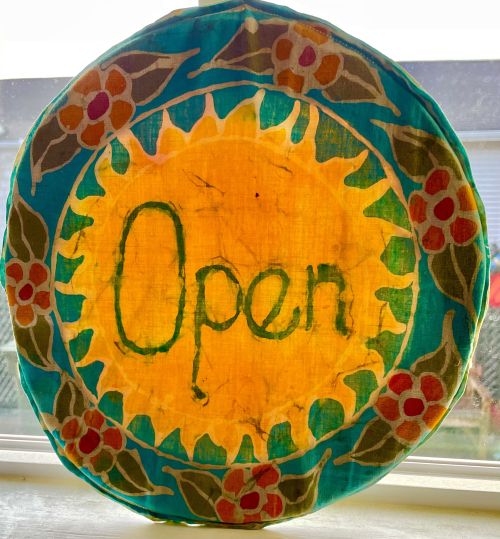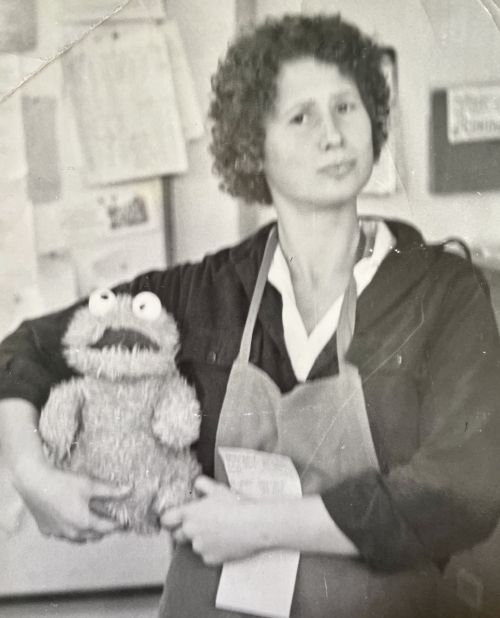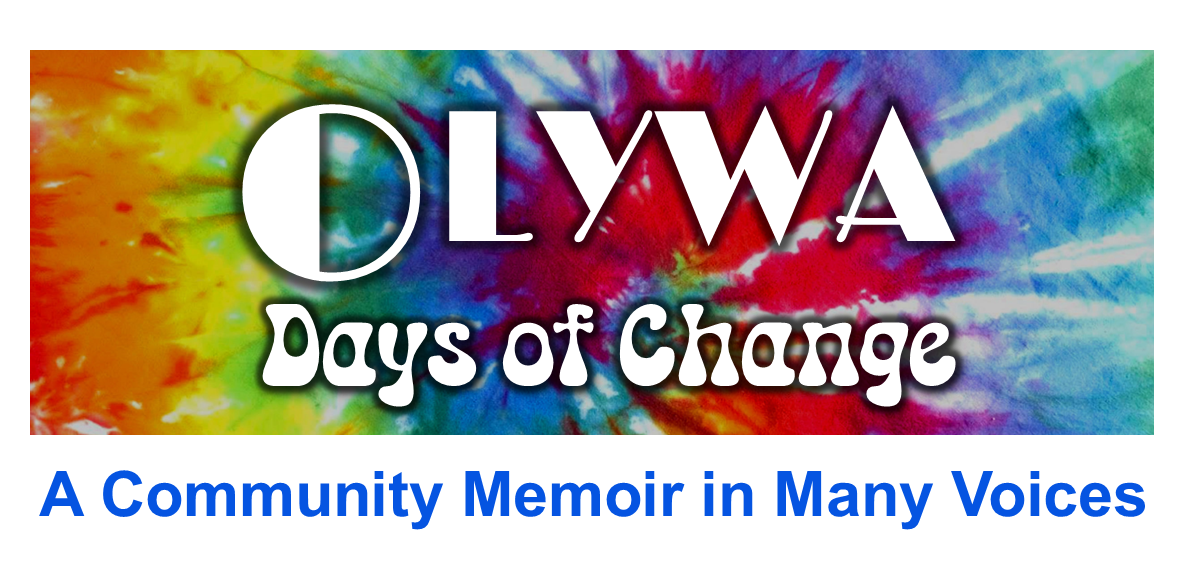FOOD
The Launch of the Columbia Street Food Co-op
By Anna Schlecht
In 1977, the brand new storefront Co-op downtown on Columbia Street was slowly coming together, the result of volunteers building shelves, laying flooring, and setting out the food. Once the store was laid out, it was time to hire the staff. That sounded like the perfect job for me.

I had moved out West to find my people—the hippies. And I figured the best places to look were at the co-ops and collective restaurants that sprouted up wherever hippies had settled. Before leaving Madison in 1976, I found a list of all the co-ops on the West Coast. But the only listings for Olympia were a couple of “food conspiracies,” or food buying clubs. Unfortunately, you had to know someone to get involved so I never joined one. But not finding them meant I wasn’t dragged into the drama over shifting from the buying clubs to the storefront, which for some people represented a loss of direct democracy over their food. After a year of controversy, the storefront finally opened with many new members. Charlie Lutz, one of the organizers, served as the first staff person.
Since this was the first year of operation, there wasn’t any history to go on. Process was something we made up as we went. No bosses and lots of opinions. As part of our emergent way of doing business, the early hiring decisions were done by a vote, and anyone interested in Co-op business could just show up at the meeting to vote. The night I was hired there were only two of us interested and we had to go through a grueling, hours long meeting to decide who would becoe the second staffer.

In the early days, our meetings were held in the center of the store as the most practical space. Our seating was very proletarian—five-gallon tubs or stacks of grain sacks. Flour dust always wafted through the air, along with the scent of fruit and vegetables edging past their prime. The buzz of the aging coolers provided a steady soundtrack. Notes were taken on the back of old fliers or food order sheets. We certainly didn’t waste any of our cooperatively held resources on bourgeois accommodations. But even if we had the means, there was an underlying belief that nothing should be wasted—not paper or food. Moreover, we didn’t want to add to the cost of food, an essential commodity for all people regardless of means. And there were lots of poor hippies. I was one of them and I needed the job.
Hiring was decided by vote. By that time, I had already worked on a few elections, notably the 1973 election of the so-called “hippie mayor” of Madison, Wisconsin—a guy named Paul Soglin. But I had never been up for election in my own right. Remembering everything I learned from my grandfather, I went to the bars for support. As a Milwaukee ward boss from the 1930s on, my grandfather ran many campaigns and knew where to find the voters. Milwaukee was the beer capital of the nation, so all politics happened in taverns. If the crowd already supported the candidate, he passed out matchbooks. If they were a hard sell, he bought a round of drinks for the house. I remembered those stories and figured I should head to Olympia’s most popular hippie bar, the Rainbow Restaurant.
After a couple beers with friends, I went down the block to the Co-op hiring meeting. As candidates, we each made our pitch for the job, telling stories of our experiences as a way to demonstrate our belief in food co-ops. Since I was only 19, I had few stories. I talked of my horror of touring the Oscar Mayer meat packing plant back home in Madison, something that grade schools did every year to teach and celebrate our food factory history. Those experiences showed me the immense wastefulness of the food industry and Oscar Mayer was a showcase of barbarism toward animals. By high school, when Frances Moore Lappe’s book Diet for a Small Planet (1971) came out, I learned the political impacts of eating so high on the food chain. Sometime later, I wrote a cover story for the Cooper Point Journal titled, “Agribusiness: A View from the Dumpster,” which captured my perspective on the politics of food. At that point in time, I wanted to dedicate my life to the Olympia Food Co-op as a means to gather healthy food from ethical and sustainable producers and make it affordable to low-income people in a way that upheld workers rights.
Both of us candidates talked and then there was a vote, deadlocked each time. After the third or fourth round of this process, my gaggle of bar friends finally stumbled in through the front door and boisterously sat down. Once they showed up and a final vote was taken, I got voted in as the second staffer. My opponent was PISSED off.
“You didn’t win. You rigged the vote with your drunk friends!”
She was right—that was NOT the way to run a co-op. This was the first of my Olympia Food Co-op dramas, born of sincere young people trying to figure out the best way forward. In the years that followed, trial and error made for better decision making. Our learning was also enhanced by a nationwide conversation held by cooperators via letters, publications, and conferences. But at that time, our concept of how people should work together for the common good was a rough work in progress.
Shortly after I started, Beth Hartmann was hired as the third staffer, and for a short time Beth and I were the dynamic duo. Then Charlie Lutz left and Jim Cunningham was hired. Beth, Jim, and I became a troika.
Largely because of Jim’s skills and experiences, he gravitated toward being the brains on the staff. His cerebral palsy limited his ability to hoist fifty-pound sacks and tubs, which left Beth and me to serve as the brawn. The delivery days were an intense workout, only slightly eased once we got a hand truck. We’d line up a bucket brigade of people to haul in all the grains, liquids, and boxed goods to their respective nooks for storage.
The sacks of grains had to be hauled up a ladder to a mezzanine storage loft, an odd space with only four and a half foot clearance. Getting the bags up there was a schlep, but moving them into their individual piles was dangerous heavy-lifting in a crouch. Totally insane. All kinds of OSHA violations. Sometimes Beth and I would play catch with the 25 pound bags of legumes.
Not having a walk-in cooler meant that all perishables went directly into our second-hand display coolers, often packed beyond capacity on delivery days. Eventually, we worked out an arrangement with Laura May from the Rainbow Restaurant to let us rent shelf space in her walk-in cooler, but still our produce suffered. Our motto of “Waste not, want not” prevailed, and we often managed to persuade, perhaps guilt trip, some of the members to buy the overripe food to avoid wasting any of it.
Not unlike other food stores, the Co-op was a family affair. Lots of people shopped with their kids. Although, unlike mainstream food stores, Co-op members and their children had looser standards of behavior and many of the kids saw the store as a playground. A couple of kids in particular loved to dive headfirst into the tubs of beans and play catch with the walnuts. Often their legs would be sticking out of our food displays and we had to pull them out by the ankles.
In one of my finer moments, I volunteered to paint the sign for our storefront. This was long before the days of spellcheck and I had no idea I was soon to become a laughing stock around the Co-op. I climbed the ladder and proudly tacked the new sign up above our front door. My pride took a hit when the next member came through the door asking, “Food ‘Coop’? Who the hell put that sign up?”
I stayed with the Co-op for about a year, on par with my attention span as an almost 20-something. Since we barely made minimum wage, I often ended the month owing more on my food tab than I earned. But I did learn a wealth of knowledge about community building and how to come together around a basic survival need—food.
It meant a lot to me to work outside the corporate agribusiness model and to support other people in becoming more conscious about where their food came from. Local control over the supply of healthy food was a cornerstone of the community we created together in Olywa during that generation. And learning together how to run a cooperative food business for people, not for profit, was a powerful experience. All of that was amazing during our first year, but we quickly outgrew the cramped little store.
I left the Co-op to go to Evergreen for a year in order to mobilize a student project to help the Co-op relocate. While the prospect of getting a college education seemed like a good idea, it was a by-product of my desire to get the Co-op moved to a better location that would allow it to grow. And we found the perfect spot in an old neighborhood grocery store on the Westside.
Once the school year was over, I left Evergreen and returned for a second stint at the Co-op. This time around we had a real walk-in cooler, aisles with well-designed shelves and brand-new refrigerated cases to display the perishable food. We finally developed a children’s play area, which proved to be a better way to stop kids from diving into flour bins. Our membership had grown exponentially, our staff became larger and better skilled, and our board had matured and begun to hone our decision-making process. We had become a real food store run on cooperative principles.
After another year I left once again, this time for good. I remained a loyal Co-op member, but I had lost my tolerance for long meetings and was never again deeply involved. I never lost my respect for the consensus process, perhaps best described as full-fledged democracy. My years at the Co-op taught me that communities work best when they have control over how they meet their essential needs. Those core beliefs have stayed with me all my life.
We encourage readers to use the form below to make comments and suggestions. Disclaimer
